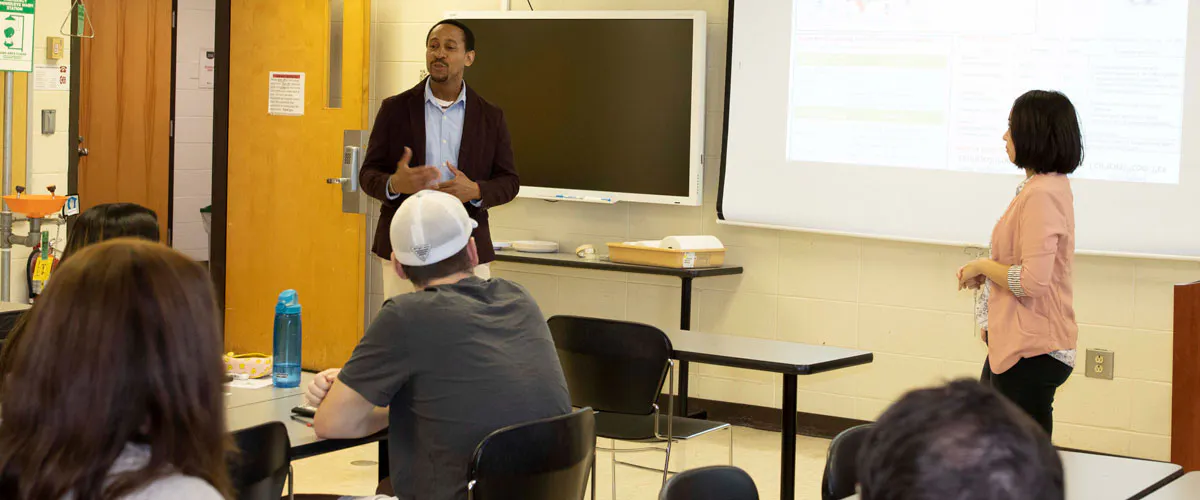The controversy over the New England Patriots' "Deflategate" continues to have an effect—only now, it's among students studying science at the University of Georgia.
As it turns out, laws of physics that apply to gases are a difficult topic—students in the university's General Chemistry class often find themselves fumbling the topic. But in the past year, students in the College of Education and the Franklin College of Arts and Sciences have tackled these lessons and come up with a new game plan: Something that involves active learning, group work and critical thinking as well as volume, pressure and temperature.
"We used an approach that was derived from a form of argumentation," said Lashawn McNeil, a science education doctoral student who is part of the research team. "It involves making claims, using evidence and applying reasoning. Students present their claims, evidence and reasoning to one another to come up with an answer they can defend individually and as a group."
At the start of class, students are given a general scenario, a data sheet and a question they need to answer using the data. By looking at the data, they can create a hypothesis and examine the evidence; then, they break into small groups and work through their individual answers together.
So, in the case of "Deflategate," McNeil said, students receive a data sheet of football air pressure before, during and after the game, as well as the temperature of the teams' locker rooms and the field for the same times. "They were supposed to look at the data and answer the question, 'Were the Patriots' balls unfairly deflated?'" said McNeil. "To answer it, they had to look at the data sheet and look at the measurements and think about what they knew about volume, pressure and temperature, and they had to use those things as evidence. Then, they had to give a theory as to how the evidence supported whether it was fairly or unfairly deflated."
The Deflategate and other lessons were designed by chemistry doctoral student Molly Atkinson, who is now in a postdoctoral position at Ohio State University; Norb Pienta, a retired chemistry professor; McNeil, Echo Mu-Yin Lin, and Sandhya Krishnan, science education doctoral students; chemistry lecturers Ana West and Wenjian Du; and Julie A. Luft, Athletic Association Professor of Mathematics and Science Education. This team is part of a larger research project focused on studying teaching and learning in the specially designed classrooms in UGA's Science Learning Center called SCALE-UP, which stands for "student-centered active learning environment for undergraduate programs."
The SCALE-UP rooms have tables for groups of six to eight students, each with a computer and access to a whiteboard. Rather than lecture to the class in a traditional format, instructors present students with work to be done in small groups. While groups work, the instructor listens to arguments, guides discussions that may be going astray, and uses the points made by students as part of a later classroom discussion.
The research in this setting is important for two reasons: STEM faculty can see how to improve student learning by adjusting their lessons to make better use of the space, and it benefits potential K-12 STEM teachers, who learn in ways they should ultimately teach.
The College of Education faculty and students working on the research collaborated with chemistry colleagues Ana West and Wenjian Du. Collectively, they design and study lessons. The team is now working on expanding the lessons to incorporate new topics for the fall semester.
It's a bonus for the cross-college team. The science faculty receive additional support since they teach in the new classrooms in the Science Learning Center, and the team gets a greater understanding about how undergraduate students learn particular scientific concepts.
The research will ultimately inform educators, at both the P-12 and college level, about group dynamics and how to structure lessons that encourage the "active learning" concept. Ultimately, it flips the classroom so students are leading the discussion and developing investigative and critical thinking skills along the way.
"You have to change the way you do your teaching in those classrooms," added McNeil. "The students are in groups, so you have to adjust how you're teaching to allow them to work together. It gives the students a more active role in the learning process."
